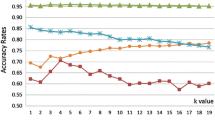Abstract
The pairwise classification approach tends to perform better than other well-known approaches when dealing with multiclass classification problems. In the pairwise approach, however, the nuisance votes of many irrelevant classifiers may result in a wrong prediction class. To overcome this problem, a novel method, Local Crossing Off (LCO), is presented and evaluated in this paper. The proposed LCO system takes advantage of nearest neighbor classification algorithm because of its simplicity and speed, as well as the strength of other two powerful binary classifiers to discriminate between two classes. This paper provides a set of experimental results on 20 datasets using two base learners: Neural Networks and Support Vector Machines. The results show that the proposed technique not only achieves better classification accuracy, but also is computationally more efficient for tackling classification problems which have a relatively large number of target classes.
Access this chapter
Tax calculation will be finalised at checkout
Purchases are for personal use only
Preview
Unable to display preview. Download preview PDF.
Similar content being viewed by others
References
Allwein, E.L., Schapire, R.E., Singer, Y.: Reducing multiclass to binary: a unifying approach for margin classifiers. Journal of Machine Learning Research 1, 113–141 (2001)
Anand, R., Mehrotra, K., Mohan, C.K., Ranka, S.: Efficient classification for multiclass problems using modular neural networks. IEEE Transactions on Neural Networks 6(1), 117–124 (1995)
Blake, C., Merz, C.: Uci repository of machine learning databases, department of information and computer sciences, university of california, irvine (1998)
Chang, C.C., Lin, C.J.: Libsvm: A library for support vector machines (2001)
Chang, C.C., Chien, L.J., Lee, Y.J.: A novel framework for multi-class classification via ternary smooth support vector machine. Pattern Recognition 44(6), 1235–1244 (2011)
Clark, P., Boswell, R.: Rule Induction with CN2: Some Recent Improvements. In: Kodratoff, Y. (ed.) EWSL 1991. LNCS, vol. 482, pp. 151–163. Springer, Heidelberg (1991)
Demsar, J.: Statistical comparisons of classifiers over multiple data sets. Journal of Machine Learning Research 7, 1–30 (2006)
Dietterich, T., Bakiri, G.: Solving multiclass learning problems via error-correcting output codes. Journal of Artificial Intelligence Research 2, 263–286 (1995)
Escalera, S., Pujol, O., Radeva, P.: Re-coding ecocs without re-training. Pattern Recognition Letters 31, 555–562 (2010)
Fei, B., Liu, J.: Binary tree of svm: A new fast multiclass training and cassification algorithm. IEEE Transactions on Neural Networks 17(696-704) (2006)
Fürnkranz, J.: Round robin classification. Journal of Machine Learning Research 2, 721–747 (2002)
Garcia-Pedrajas, N., Ortiz-Boyer, D.: Improving multiclass pattern recognition by the combination of two strategies. IEEE Transactions on Pattern Analysis and Machine Intelligence 28(6), 1001–1006 (2006)
Garcia-Pedrajas, N., Ortiz-Boyer, D.: An empirical study of binary classifier fusion methods for multiclass classification. Information Fusion 12(2), 111–130 (2011)
Hastie, T., Tibshirani, R.: Classification by pairwise coupling. In: Proceedings of the 1997 Conference on Advances in Neural Information Processing Systems 10, NIPS 1997, pp. 507–513. MIT Press, Cambridge (1998)
Hsu, C.W., Lin, C.J.: A comparison of methods for multiclass support vector machines. IEEE Transactions on Neural Networks 13(2), 415–425 (2002)
Hullermeier, E., Vanderlooy, S.: Combining predictions in pairwise classication: An optimal adaptive voting strategy and its relation to weighted voting. Pattern Recognition 43(1), 128–142 (2010)
Iman, R., Davenport, J.: Approximations of the critical regions of the friedman statistic. Communications in Statistics 6, 571–595 (1980)
Knerr, S., Personnaz, L., Dreyfus, G.: Single-layer learning revisited: a stepwise procedure for building and training a neural network. In: Fogelman, J. (ed.) Neurocomputing: Algorithms, Architectures and Applications. Springer (1990)
Ko, J., Byun, H.: Binary Classifier Fusion Based on the Basic Decomposition Methods. In: Windeatt, T., Roli, F. (eds.) MCS 2003. LNCS, vol. 2709, pp. 146–155. Springer, Heidelberg (2003)
Meyer, D., Leisch, F., Hornik, K.: The support vector machine under test. Neurocomputing 55(1-2), 169–186 (2003)
Moreira, M., Mayoraz, E.: Improved Pairwise Coupling Classification with Correcting Classifiers. In: Nédellec, C., Rouveirol, C. (eds.) ECML 1998. LNCS, vol. 1398, pp. 160–171. Springer, Heidelberg (1998)
Park, S.-H., Fürnkranz, J.: Efficient Pairwise Classification. In: Kok, J.N., Koronacki, J., Lopez de Mantaras, R., Matwin, S., Mladenič, D., Skowron, A. (eds.) ECML 2007. LNCS (LNAI), vol. 4701, pp. 658–665. Springer, Heidelberg (2007)
Platt, J.C., Cristianini, N., Shawe-taylor, J.: Large margin dags for multiclass classification. Advances in Neural Information Processing Systems 12, 547–553 (2000)
Wang, S.-J., Mathew, A., Chen, Y., Xi, L.-F., Ma, L., Lee, J.: Empirical analysis of support vector machine ensemble classifiers. Expert Systems with Applications 36(3, Part 2), 6466–6476 (2009)
Windeatt, T., Ghaderi, R.: Binary labelling and decision-level fusion. Information Fusion 2(2), 103–112 (2001)
Wu, T.F., Lin, C.J., Weng, R.C.: Probability estimates for multi-class classification by pairwise coupling. J. Mach. Learn. Res. 5, 975–1005 (2004)
Author information
Authors and Affiliations
Editor information
Editors and Affiliations
Rights and permissions
Copyright information
© 2012 Springer-Verlag Berlin Heidelberg
About this paper
Cite this paper
Bagheri, M.A., Gao, Q., Escalera, S. (2012). Efficient Pairwise Classification Using Local Cross Off Strategy. In: Kosseim, L., Inkpen, D. (eds) Advances in Artificial Intelligence. Canadian AI 2012. Lecture Notes in Computer Science(), vol 7310. Springer, Berlin, Heidelberg. https://doi.org/10.1007/978-3-642-30353-1_3
Download citation
DOI: https://doi.org/10.1007/978-3-642-30353-1_3
Publisher Name: Springer, Berlin, Heidelberg
Print ISBN: 978-3-642-30352-4
Online ISBN: 978-3-642-30353-1
eBook Packages: Computer ScienceComputer Science (R0)




